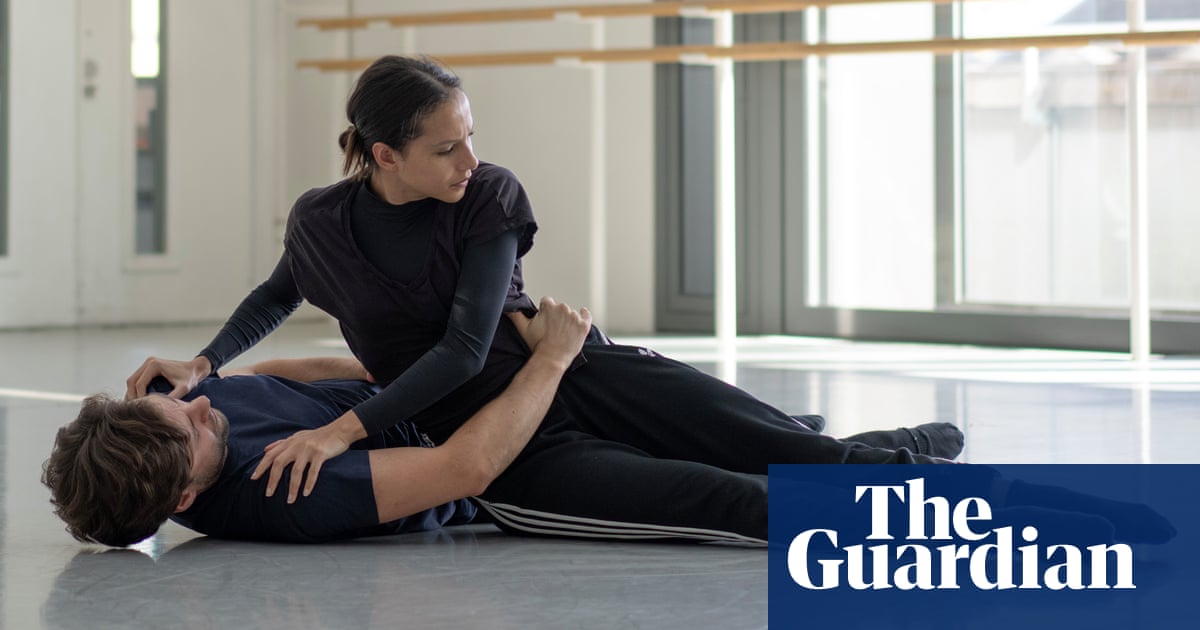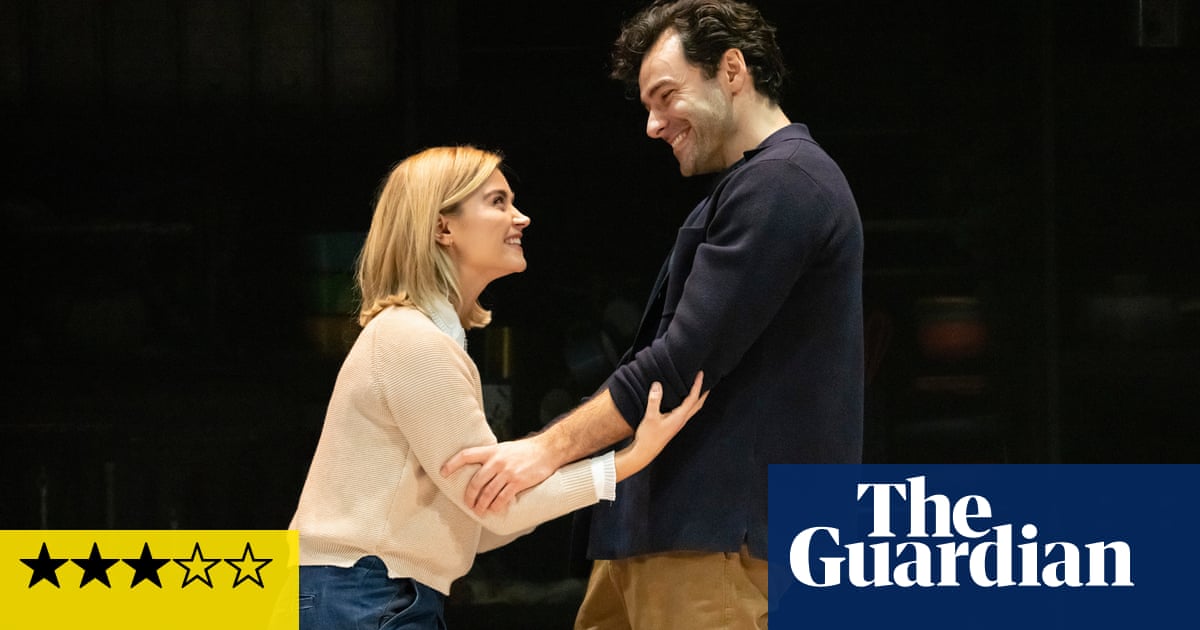
‘Why don’t you start in the weird position?” suggests director Ed Madden. “That’s a technical term!” he calls across the Royal Ballet’s Opera House studio. “Weird position” may not derive from the classical ballet textbook, but it perfectly suits the making of The Limit – an audacious production that reimagines Sam Steiner’s cult play Lemons Lemons Lemons Lemons Lemons with some of the Royal Ballet’s boldest artists.
The encounter began with the amiable but ambitious Alexander Campbell, an Australian-born principal with the Royal. “In lockdown, I was thinking about the work I wanted to do,” he says. “I was keen to work with people who inspired me.” He and fellow principal Francesca Hayward considered working with text, and his producer sister Amelia recommended Lemons, which imagines a world giving people a cruelly restricted daily allowance of words, and its impact on a young couple, Bernadette and Oliver. “I read it, then read it again straight away.”
Campbell explains how he contacted the writer and “was touched by how gracious he was about the idea”. Learning how integral Madden had always been to the play, “I felt we could only benefit to have a director who understood the original source material at a kind of cellular level.”
“The first conversations Sam [Steiner] and I had about the play were probably in August 2014,” Madden recalls. The two Warwick University students formed their company Walrus, taking Lemons to Edinburgh and then London in 2015. The play had an immediate impact – I can’t forget that breathless first production – and reached an even wider audience this year, through a West End revival starring Jenna Coleman and Aidan Turner. The dance-inflected version is a further step. “The original production had no designer or lighting designer, just us, so this is definitely the most formally ambitious thing I’ve worked with.” Madden reflects for a moment. “I’m still thinking it could be a noble failure.”
For Steiner, “It sounded like a mad, strange challenge at a point where I wanted to do something that shook me out of my normal shit.” Even so, this was his baby. “When you have the writer in the room you feel responsible for not butchering his work,” Hayward admits, “but from the very first moment, Sam and Ed have never wanted to re-create what they’ve done before, but to breathe new air into it.”
“I’ve tried not to be precious,” the playwright confirms, marvelling at this “incredible, surreal experience with something that I wrote when I was 21. We did our original show in 2015 and we’re so proud of it – we don’t need to do that show again. What I’m protective of is trying to keep the narrative clarity.”
Clarity remains the focus in rehearsal, less than two weeks before the first performance. Campbell, who has a new parent’s sleep-deprived stubble, and the pin-neat Hayward refine and distil their movement, looping carefully around each other. Just as the characters have to make their words count, so, too, does the movement feel deliberate, no motion wasted. A fatigued desperation thrums beneath them: “there’s a sense they might be each other’s life raft,” Steiner suggests.
Although eloquent, Hayward and Campbell’s ballet performances are silent. “Acting without speaking is what I love,” Hayward confirms. “With this, you can know your choreography, you can know your words. But as soon as you try to put them together and speak while moving, you shut down – you can’t move and can’t speak. It can be painful and we needed Ed and Sam to feed us the words one by one as we put them with movement. We just had to bash through it together until we got it in our bodies.”
“In the rehearsal room you work with every actor specifically according to their needs and skills,” Madden says. “That’s been very particular in this process – there’s no doubt that they’re world-class performers, but acting with text in this way is a muscle to be developed. They’ve worked really hard.” Campbell admits, “if I’d known how technically difficult it was I probably wouldn’t have suggested it so comfortably. It represents a huge challenge. But our enthusiasm probably got us over a lot of obstacles.”
Although, as Madden says, “Lemons is a play about what you do with words, in this context dance becomes another language within the storytelling.” Hayward suggested Kristen McNally (“one of my favourite people in the whole world”) should lead that strand. A vivid dancer and an always surprising choreographer, McNally imagined she’d simply provide movement direction – “maybe a dance break, a few little moves” – but adored the play’s “quirky, offbeat” scenes. “It resonated with the style of little things I make,” she says. “Like, [being in] a pet cemetery, talking about dead cats? Love it.”
As Campbell says, “in most ballets I’ve worked on, the choreographer is god. But Kristen has this wonderful lack of ego.” Madden doubted that “any choreographer would be interested in that collaboration, but her choreography is lyrical and playful, spiky and colloquial in ways that the play is too. Sharing the leadership of the room with her is one of the great joys of my career.”
Although Madden admits that he and Steiner felt “more than a touch of impostor syndrome” when they entered the Royal Opera House, they have come to appreciate how “dance gives you the capacity to compress or expand an emotional sentence enormously.” For Steiner, “it gives a crystalline emotionality. It feels quite liberating: there are things that dance does better.”
Unusually for a dance production, the spare, uncanny score arrived late in the process – Isobel Waller-Bridge composed to a film of the work as it took shape earlier this summer. The dominant impulse to the movement, McNally explains, wasn’t music or even text, but thought: “What triggered that? What’s the dialogue in your head? [Previously in the characters’ relationship] they avoided conversations they should have had, issues they should have dealt with.” Now, they literally can’t discuss anything in depth. As Campbell says, The Limit “is about how poorly we can communicate even though we have an infinite amount of words.”
They all saw the West End revival: “It’s not often you watch a play and know all the words,” Hayward laughs. It spurred them on: “We suddenly got very brave,” says McNally. As Madden says, “it gave us the confidence to go, this production of the full text gives a large scale voice to the impulse of Sam’s play – now we can do something that takes it in a different direction.”
The team crease each other up in rehearsal, then focus with shivery intensity. It’s a reminder of the many forms communication can take. As she digs into the material, Hayward believes at its heart is “how we take language for granted. Maybe we don’t cherish it as much as we should.” Tracing the way “the threads binding Bernadette and Oliver together disappear” is, she says, “heartbreaking. You can feel that as you’re reading it, but definitely as you’re performing it, for sure.”
The Limit is at the Linbury theatre, London, from 20-28 October.












